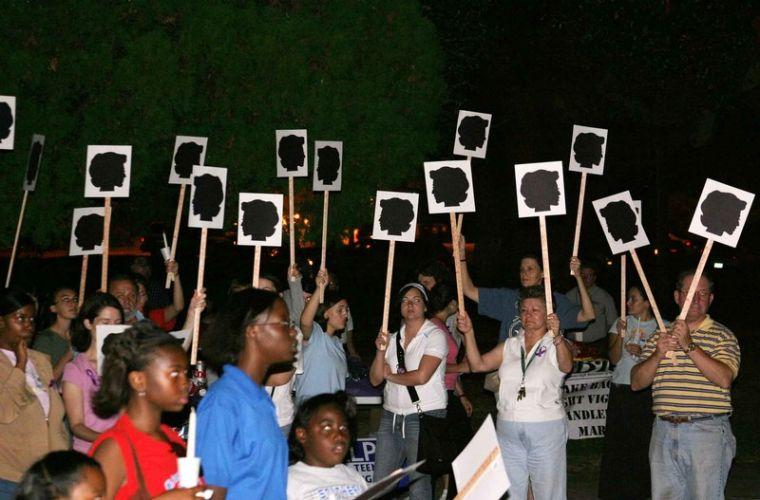Homeowners illuminated the 20th annual Take Back the Night Marchon Sunday night by turning on their porch lights in support of theanti-domestic violence cause. Some greeted the marchers in front oftheir houses, holding their own lighted candles.
Marchers shouted, “Two, four, six, eight. Stop the violence,stop the hate,” and other chants during the moonlit processionthrough the Garden District and neighborhoods near Baton RougeMagnet High School.
Some members held signs, from the witty “Give me a big kissbecause I sure don’t want your fist,” to the simple “Stop theabuse.”
At the vigil, Baton Rouge Mayor-President Bobby Simpson declaredOctober 2004 Domestic Violence Awareness Month in Baton Rouge toencourage the elimination of personal and institutionalviolence.
LSU’s Wellness Center and Women’s Center, the Rape CrisisCenter, Southern University and the Battered Women’s Shelter, amongothers, sponsored the march.
“Take Back the Night is a symbolic name,” said Kathy Saichuk,Student Health Center Coordinator. “Darkness represents beingtrapped, and people are scared to be out at night.”
To combat the darkness, members of the sponsoring organizationslit 10 different-colored candles representing the women, men andchildren who have been battered, sexually abused and raped byfamily members and significant others.
From these candles, the flame passed through the entireprocession, illuminating the march.
“[The march] is going to hit home,” said Gina Roussel, aUniversity graduate student in social work.
Roussel said she decided to work at Take Back the Night becausethe social work department gives students opportunities to work inthe community, and Take Back the Night is a quality program.
Brandy Boxie, a member of the National Association of BlackSocial Workers, said Take Back the Night provided an opportunity toparticipate in an event that supports ending domestic violence andhelps develop community awareness.
The sponsors also read names of 60 women who died from violenceby intimate partners.
They included the victims of convicted killer Derrick Todd Lee,who authorities have linked by DNA to the deaths of seven southLouisiana women.
The list also included Monique Beckers, wife of French studiesprofessor Claude Vandeloise. Baton Rouge Police arrested VandeloiseFriday on charges of manslaughter. Authorities found Beckers deadin her bathtub, and an autopsy showed she died of a brainhemorrhage caused by blunt trauma.
During the procession, marchers walked past Beckers’ home in theGarden District.
Readers also recited the names of women, children and one mankilled because of domestic violence. As they recited the victims’names, people held up signs with a silhouette picture to add a faceto the name.
“This is the first year we’ve used silhouettes,” Saichuksaid.
Saichuk said as all of the signs went up, she realized how manypeople had fallen victim to domestic violence.
As the Caledonian Pipes of Baton Rouge played “Amazing Grace” ontheir bagpipes, the procession marched to the beat of the drums andthe rhythm of the bagpipes through four neighborhoods of differenteconomic levels.
“Violence against women permeates all socioeconomic levels,”Saichuk said.
Before the march, victims from different social and economicbackgrounds gave their testimonials and support to others insimilar plights.
One woman only identified herself as “Anonymous,” since herlegal battles with her abuser are ongoing.
She said she refuses to be labeled a “battered woman,” but onceshe left her abuser, she considered herself a “bettered woman.”
“It is empowering to feel like a bettered woman,” she said.
The woman also stressed to abused victims the importance ofunderstanding the Louisiana Post-Separation Family Violence ReliefAct, which defines the rights of parents in child custody disputes.She said she signed papers for joint custody because she was notaware of her rights.
Marjorie Searcy, a singer, songwriter and child victim ofdomestic violence, said after enduring abuse for 17 years, shedecided to break the unspoken “Don’t tell” rule.
Searcy now advocates her anti-violence message through song andspeech. She spoke of her past and sang original songs about herabuse.
In a letter from women in the Louisiana Correctional Institutefor Women in St. Gabriel, La., the survivors of domestic violencesaid they are incarcerated and safe but isolated from theirfamilies, children and careers. Some are in prison for killingtheir abusive partners.
“Speak up,” the letter said. “Get help before it’s too late foryou, or for him. No one wins.”
Marchers strive to end domestic violence
October 19, 2004
Marchers strive to end domestic violence






